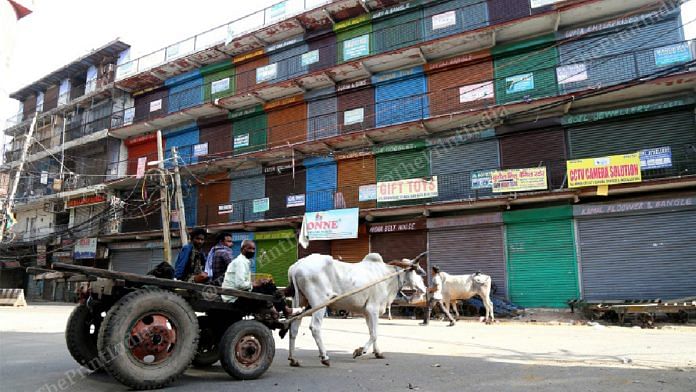Mainstream newspapers Tuesday highlight the news about PM Modi and union ministers taking a 30 per cent pay cut to fund the fight against Covid-19.
Reports on post-lockdown scenarios and strategies pepper most front pages, along with developments on the government’s tracking of Tablighi Jamaat members.
The financial papers note disruptions caused by Covid-19 that have led to a surge in unemployment, contraction in the services industry and a blow to India’s largest consumer finance company, Bajaj Finance.
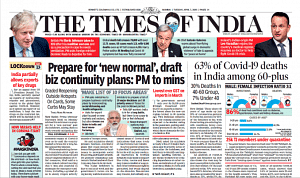 The lead story on The Times Of India is ‘Prepare for ‘new normal’, draft biz continuity plans: PM to mins’. To plan a phased un-lockdown, the PM “advised his ministers to prepare for a ‘new normal’ post the lockdown, asking them to work towards mitigating the economic impact of Covid-19… Modi said at a video-linked cabinet meeting that it was also essential to strategise for emergent conditions, including a graded plan to slowly reopen activity outside of hotspot areas.”
The lead story on The Times Of India is ‘Prepare for ‘new normal’, draft biz continuity plans: PM to mins’. To plan a phased un-lockdown, the PM “advised his ministers to prepare for a ‘new normal’ post the lockdown, asking them to work towards mitigating the economic impact of Covid-19… Modi said at a video-linked cabinet meeting that it was also essential to strategise for emergent conditions, including a graded plan to slowly reopen activity outside of hotspot areas.”
The paper also reports on strong economic reasons to ease restrictions with ‘Lowest ever GST on imports in March’. According to TOI, the government earned only over Rs 18,000 crore through integrated GST (IGST) on imports in March — “the lowest since the new tax regime kicked in 30 months ago’’. This indicates collections are expected to be weaker in coming months owing to the pandemic.
The other main lead highlights data from the Health Ministry that indicates the severity of the coronavirus challenge for the elderly: the report ‘63% of Covid-19 deaths in India among 60-plus’ says that they make up just 19 per cent of coronavirus patients but account for almost two-thirds of the fatalities. “As many as 86% of the fatalities had conditions such as diabetes, hypertension, heart and kidney disease.”
And to personalise the battle against coronavirus, an officer who was on the frontlines of the Covid-19 fight could not hold his newborn daughter. “It’s a girl! With the message came overpowering emotion. Rajeev Rai—the field officer leading the massive containment exercise to check the spread of Covid-19 in Noida was ecstatic, but also relieved. After all, he had had to quarantine himself in the guest room of his house for three weeks so as not to endanger his pregnant wife and their eight-year-old daughter..”
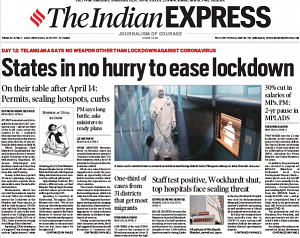 The Indian Express leads with a different aspect of the coronavirus crisis: in ‘States in no hurry to ease lockdown’, the newspaper presents a state-wise analysis of a possible post-lockdown scenario — “Telangana Chief Minister K Chandrashekar Rao said he was in favour of extending the lockdown in his state, Maharashtra, Rajasthan, UP, Assam, Chhattisgarh and Jharkhand indicated that they would not fully lift the restrictions after next Tuesday. Assam, which has reported 26 cases, is planning a registration system to regulate those who wish to enter the state after the lockdown. Rajasthan (274) is working on a “staggered” exit strategy with curbs in “high risk zones”, while Chhattisgarh (10) Chief Minister Bhupesh Baghel wrote to Prime Minister Narendra Modi against lifting interstate travel over worries the outbreak will spread.”
The Indian Express leads with a different aspect of the coronavirus crisis: in ‘States in no hurry to ease lockdown’, the newspaper presents a state-wise analysis of a possible post-lockdown scenario — “Telangana Chief Minister K Chandrashekar Rao said he was in favour of extending the lockdown in his state, Maharashtra, Rajasthan, UP, Assam, Chhattisgarh and Jharkhand indicated that they would not fully lift the restrictions after next Tuesday. Assam, which has reported 26 cases, is planning a registration system to regulate those who wish to enter the state after the lockdown. Rajasthan (274) is working on a “staggered” exit strategy with curbs in “high risk zones”, while Chhattisgarh (10) Chief Minister Bhupesh Baghel wrote to Prime Minister Narendra Modi against lifting interstate travel over worries the outbreak will spread.”
To deal with the Covid-19 crisis, ‘30% cut in salaries of MPs, PM; 2-year pause in MPLADS’. According to the Express, the government “decided to suspend all MPLADS (Members of Parliament Local Area Development Scheme) funds — under which each elected MP gets Rs 5 crore annually for development work in his/ her constituency — for two financial years starting April 1. The money from the MPLADS funds — nearly Rs 8,000 crore — will go to the Consolidated Fund of India, which, the government said, will be used in the battle against COVID-19.”
Express also notes some non-Covid-19 related news, coming from Kashmir: ‘Army: Among 10 killed in hand-to-hand combat in J&K, 5 commandos, 5 militants’. According to the report, “Four soldiers under the command of a Junior Commissioned Officer from one of the most professional Para SF units were air-dropped near the LoC after information on the infiltrators was received. An intense hand-to-hand battle ensued and all five terrorists were eliminated”.
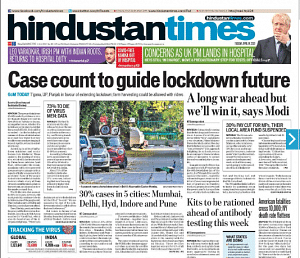 Hindustan Times‘ front page brings another angle to the data on the coronavirus spread: it says that ‘30% cases in 5 cities: Mumbai, Delhi, Hyd, Indore and Pune’.
Hindustan Times‘ front page brings another angle to the data on the coronavirus spread: it says that ‘30% cases in 5 cities: Mumbai, Delhi, Hyd, Indore and Pune’.
The paper reports that “at least 30% of the 4,780 Covid-19 cases reported in the country’’ have come from these five cities. This indicates that “India’s urban centres have been the main epicentres of the coronavirus battle, according to state and central government data”/
The daily also notes that the two worst-hit cities — Delhi and Mumbai — together have reported at least 1,000 cases.
And to gear up for the long battle against Covid-19, ‘Kits to be rationed ahead of antibody testing this week’. According to HT, “States across the country will soon receive half a million antibody testing kits from the Centre, as India embarks on more aggressive testing in so-called containment zones and clusters,’’ the paper notes.
And in a new experiment for India, here’s the first drive-through testing: ‘Delhi lab starts ‘drive-through’ Covid-19 test’ explains that Delhi’s Dr Dang’s Laboratories began to offer this service in one part of Delhi.
How will it happen: “Fill out an online form, drive to the designated collection centre, display your identity proof, roll down your car window, tilt your head back to allow the collection of swab samples from your throat and nose, and leave – a person suspected to have the coronavirus disease (Covid-19) can now undergo testing in these simple steps at a private lab’s drive-through centre in west Delhi.”
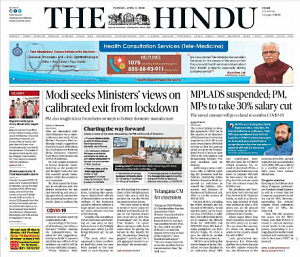 The Hindu’s lead story is ‘Modi seeks Ministers’ views on calibrated exit from lockdown’. According to the national daily, Prime Minister Narendra Modi “sought measures to bolster domestic manufacturing as the pandemic had brought home the fact that essential goods manufacture within the country is very important.”
The Hindu’s lead story is ‘Modi seeks Ministers’ views on calibrated exit from lockdown’. According to the national daily, Prime Minister Narendra Modi “sought measures to bolster domestic manufacturing as the pandemic had brought home the fact that essential goods manufacture within the country is very important.”
And in some bad Covid-19 news, “India has registered the largest single-day rise in COVID-19 cases and deaths in the past 24 hours with 704 new cases and over 30 deaths reported. The tally on Monday stood at 4,281 confirmed cases and 111 deaths, according to the Union Health Ministry”, reports Hindu.
It seems as though Covid-19 is not sparing tigers either, ‘Pench tiger death raises COVID-19 fears’. The paper reports, “The death of a 10-year-old ailing male tiger, in the Pench Tiger Reserve (PTR) — the country’s most munificent reserve —that succumbed to a ‘respiratory illness’ last Saturday would have been a routine affair. “But a report of a confirmed COVID-19 infection in a tiger at the Bronx Zoo, in New York, United States and advisories by divisions of the Environment Ministry… have now got the zoo authorities “puzzling on whether the tiger should be tested for the novel coronavirus disease.”
And to make matters worse the coronavirus has increasingly developed a communal tinge: ‘Rumours fuel attacks on minority community’ says, “In two separate incidents, a Muslim family was attacked by some youths in Gurugram minutes after the 9 p.m. lights-out on Sunday, while a 30-year-old man from the community was thrashed by a group of men in Harewali village in Bawana in outer-north Delhi over suspicion that he was part of a ‘conspiracy’ to spread COVID-19.”
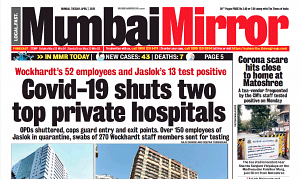 The Mumbai daily’s lead story is about the impact of the coronavirus on medical workers in the city: ‘Wockhardt’s 52 employees and Jaslok’s 13 test positive, Covid-19 shuts two top private hospitals’. The paper reports, “Both hospitals have ceased new admissions… The BMC has declared the two hospitals as “containment zones” with restrictions imposed on entry and exit.’’ The report says that in a statement, “Wockhardt identified a 70-year-old patient, who was admitted to the hospital on March 17 for a cardiac emergency, as the index case – the source of the infection.’’
The Mumbai daily’s lead story is about the impact of the coronavirus on medical workers in the city: ‘Wockhardt’s 52 employees and Jaslok’s 13 test positive, Covid-19 shuts two top private hospitals’. The paper reports, “Both hospitals have ceased new admissions… The BMC has declared the two hospitals as “containment zones” with restrictions imposed on entry and exit.’’ The report says that in a statement, “Wockhardt identified a 70-year-old patient, who was admitted to the hospital on March 17 for a cardiac emergency, as the index case – the source of the infection.’’
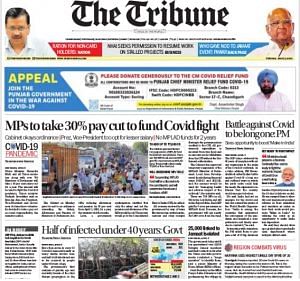 Apart from the lead report on the pay cut for MPs, there’s a report on the extent of the Tablighi Jamaat’s role in the spurt of cases through India in The Tribune. The story, ‘25,000 linked to Jamaat isolated’, notes the Ministry of Home Affairs’ “mega operation” to track down Tablighi Jamaat members and their contacts.
Apart from the lead report on the pay cut for MPs, there’s a report on the extent of the Tablighi Jamaat’s role in the spurt of cases through India in The Tribune. The story, ‘25,000 linked to Jamaat isolated’, notes the Ministry of Home Affairs’ “mega operation” to track down Tablighi Jamaat members and their contacts.
In another development on the Tablighi Jamaat case (‘170 on HP buses with 3 patients under lens’), the newspaper reports: that 170 passengers, including three children, who had travelled along with three Covid-19 patients from Delhi to Nalagarh and Hamirpur on 18-19 March 18 in two Himachal Roadways Transport Corporation (HRTC) buses are under the scanner of the health authorities.
Noting that “technology is here to stay”, the Indian Supreme Court issues guidelines to be followed by courts across India to conduct judicial proceedings through video conferencing, notes Tribune’s anchor story (‘Supreme Court lists norms for hearings via video link’).
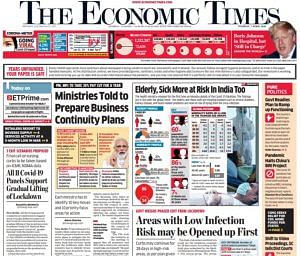 The Economic Times’ front page is full of reports of the government’s post-lockdown strategy. For starters, its lead “Ministries Told to Prepare Business Continuity Plans” notes PM Modi’s larger plan to “put the economy back into recovery mode”.
The Economic Times’ front page is full of reports of the government’s post-lockdown strategy. For starters, its lead “Ministries Told to Prepare Business Continuity Plans” notes PM Modi’s larger plan to “put the economy back into recovery mode”.
A narrow column ‘All 11 Covid-19 panels support gradual lifting of lockdown’ says the final call on easing movement restrictions will depend on data from ICMR and National Disaster Management Authority (NDMA) on the status of the spread of the virus in India and will be available in three days.
In some grim news, the paper reports that Tata Starbucks India has joined the long list of restaurant chains including McDonald’s and Jubilant who are seeking rent waivers from landlords and mall owners.
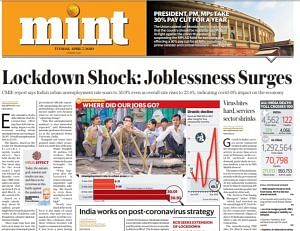 Mint leads with disheartening news on the state of jobs in the country in ‘Lockdown Shock: Joblessness Surges’. The paper notes that according to the Centre for Monitoring Indian Economy (CMIE), the “devastating” coronavirus pandemic has increased urban unemployment to a “soaring” 30.9 per cent and overall unemployment to 23.4 per cent. The report adds: “Nearly one-third of the workforce is also made of casual workers, who may not have much of a safety net if the economic flux continues”.
Mint leads with disheartening news on the state of jobs in the country in ‘Lockdown Shock: Joblessness Surges’. The paper notes that according to the Centre for Monitoring Indian Economy (CMIE), the “devastating” coronavirus pandemic has increased urban unemployment to a “soaring” 30.9 per cent and overall unemployment to 23.4 per cent. The report adds: “Nearly one-third of the workforce is also made of casual workers, who may not have much of a safety net if the economic flux continues”.
India’s services sector is also reeling under Covid-19 disruptions and poor demand. In a brief report ‘Virus bites hard, services sector shrinks’, the newspaper finds that the services sector contracted in March after “posting the strongest rise in business activity in more than seven years in February”.
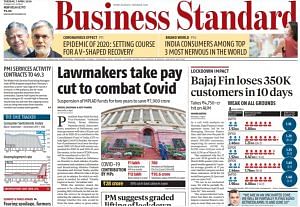 In its lead ‘Lawmakers take pay cut to combat Covid’, Business Standard notes that the PM and union ministers’ pay cut will be applicable to their salary, not pension or allowances. It also reports the Opposition’s unhappiness with the two-year suspension of the MPLAD fund — a fund that enables members of parliaments to recommend developmental work in their constituencies.
In its lead ‘Lawmakers take pay cut to combat Covid’, Business Standard notes that the PM and union ministers’ pay cut will be applicable to their salary, not pension or allowances. It also reports the Opposition’s unhappiness with the two-year suspension of the MPLAD fund — a fund that enables members of parliaments to recommend developmental work in their constituencies.
In other less cheery news, the newspaper notes how “the unprecedented lockdown has hurt the country’s largest consumer finance company”. In ‘Bajaj Fin loses 350k customers in 10 days’, it says the company is focusing on cost cutting and its “recovery in operations hinges on when economic activities restart in the country”.


